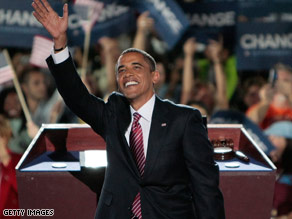(CNN) -- Sen. John McCain has picked Alaska Gov. Sarah Palin as his running mate, a senior McCain campaign official told CNN on Friday.

Alaska Gov. Sarah Palin, here in February, will be Sen. John McCain's running mate, a campaign official says.
Palin, 44, who's in her first term as governor, is a pioneering figure in Alaska, the first woman and the youngest person to hold the state's top political job.
She catapulted to the post with a strong reputation as a political outsider, forged during her stint in local politics. She was mayor and a council member of the small town of Wasilla and was chairman of the state Oil and Gas Conservation Commission, which regulates Alaska's oil and gas resources, in 2003 and 2004.
The conservative Palin defeated two so-called political insiders to win the governor's job -- incumbent Gov. Frank Murkowski in the GOP primary and former two-term Democratic Gov. Tony Knowles in the 2006 general election. iReport.com: What do you think of McCain's VP pick?
Palin made her name in part by backing tough ethical standards for politicians. During the first legislative session after her election, her administration passed a state ethics law overhaul.
Palin's term has not been without controversy. A legislative investigation is looking into allegations that Palin fired Alaska's public safety commissioner because he refused to fire the governor's former brother-in-law, a state trooper.
Palin acknowledged that a member of her staff made a call to a trooper in which the staffer suggested he was speaking for the governor.
Palin has admitted that the call could be interpreted as pressure to fire state trooper Mike Wooten, who was locked in a child-custody battle with Palin's sister.
"I am truly disappointed and disturbed to learn that a member of this administration contacted the Department of Public Safety regarding Trooper Wooten," Palin said. "At no time did I authorize any member of my staff to do so."
Palin suspended the staffer who made the call.
Palin has focused on energy and natural resources policy during her short stint in office, and she is known for her support of drilling in the Alaska National Wildlife Refuge, a position opposed by McCain but supported by many grass-roots Republicans.
Her biography on the state governor's Web site says one of the two major pieces of legislation passed during her first legislative session was a competitive process to construct a gas pipeline.
Palin started Alaska's Petroleum Systems Integrity Office, an oversight and maintenance agency for the state's oil and gas equipment, facilities and infrastructure. She created the Climate Change Subcabinet that would forge a climate change strategy, according to the biography.
Palin chairs the Interstate Oil and Gas Compact Commission, a multistate panel "that promotes the conservation and efficient recovery of domestic oil and natural gas resources while protecting health, safety and the environment," the biography says.
She has been named chair of the National Governors Association's Natural Resources Committee. That panel is focused on legislation to ensure that federal policies take state priorities into account in agriculture, energy, environmental protection and natural resource management.
She is a lifetime member of the National Rifle Association and takes part in two of Alaska's popular pastimes -- fishing and hunting.
The governor's biography says Palin's other priorities have been "education and workforce development, public health and safety, and transportation and infrastructure development."
The biography touts her other achievements as governor as the investment of $5 billion in state savings, overhaul of educational funding and implementation of a program to help low-income elderly Alaskans.
Born in Idaho, she is a longtime Alaskan and a Protestant. Her biography says she arrived in Alaska in 1964 "when her parents came to teach school in Skagway."
She graduated from Wasilla High School in 1982 and received a bachelor of science degree in communications-journalism from the University of Idaho in 1987.
Her husband is Todd Palin, an oil production operator on Alaska's North Slope. They have five children, including a son who enlisted in the Army last year.
Congressional Quarterly notes Sarah Palin's other past occupations, including commercial fishing company owner, outdoor recreational equipment company owner and sports reporter.
Palin also made an unsuccessful run for lieutenant governor in 2002, Congressional Quarterly said.Original here



 Today, Time Magazine published an
Today, Time Magazine published an  Yesterday, Sen. John McCain promoted his veterans private health care “
Yesterday, Sen. John McCain promoted his veterans private health care “



